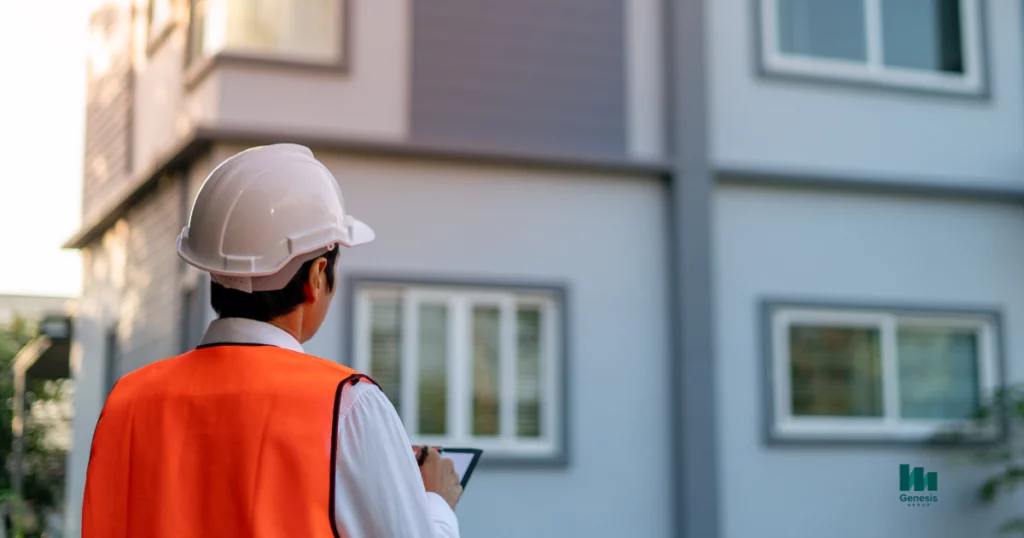The Ultimate Home Inspection Checklist for Buyers:
A Comprehensive Guide for Canadian Homebuyers

On this Page
Your Essential Guide to a Thorough Home Inspection
A home inspection is a vital part of the homebuying process, giving you the knowledge to identify potential issues or necessary repairs before you finalize your purchase. In this comprehensive Home Inspection Checklist for Buyers, we’ll detail what to expect during a home inspection and provide a thorough checklist to help you prepare for this critical step in your journey to homeownership.
Navigate Your Home Inspection with Confidence
Ensure you’re fully prepared with our expert advice and step-by-step checklist, making your homebuying experience smooth and informed. Discover how to spot potential red flags and make the most of your home inspection.
What is a Home Inspection?
A home inspection is a professional evaluation of a property’s condition, conducted by a certified home inspector. It helps identify potential issues or defects in the home’s structure, systems, and components, providing valuable information for both buyers and sellers.
Why is a Home Inspection Important?
A home inspection offers several benefits, including:
- Identifying potential issues: A home inspection can uncover hidden problems that may require costly repairs or impact the property’s value.
- Negotiating power: With a thorough understanding of the property’s condition, you can negotiate repairs, price adjustments, or contingencies with the seller.
- Peace of mind: A detailed home inspection can provide confidence in your investment, ensuring you’re making an informed decision.
Choosing a Home Inspector
When selecting a home inspector, consider the following factors:
- Certification: Ensure the inspector is certified by a reputable organization, such as the Canadian Association of Home and Property Inspectors (CAHPI).
- Experience: Look for an inspector with experience in your region and the type of property you’re considering.
- Recommendations: Ask friends, family, or your real estate agent for referrals to trusted home inspectors.
Home Inspection Checklist: What to Expect
A comprehensive home inspection should cover the following areas:
a) Exterior
- Foundation: Check for cracks, settling, or water damage.
- Roof: Inspect shingles, flashing, gutters, and downspouts for signs of wear or damage.
- Siding and trim: Look for damage, rot, or peeling paint.
- Doors and windows: Ensure proper sealing and functioning.
- Driveways and walkways: Check for cracks or uneven surfaces.
b) Interior
- Flooring: Inspect for damage, wear, or unevenness.
- Walls and ceilings: Look for cracks, water stains, or signs of mold.
- Doors and windows: Ensure proper operation and insulation.
- Electrical system: Check for proper wiring, functioning outlets, and adequate lighting.
- Plumbing: Inspect for leaks, proper water pressure, and functioning fixtures.
c) Heating, Ventilation, and Air Conditioning (HVAC)
- Furnace: Check for proper operation, age, and maintenance history.
- Air conditioning: Ensure proper functioning and sufficient cooling capacity.
- Ventilation: Inspect for proper airflow and functioning exhaust fans.
d) Kitchen
- Appliances: Test for proper operation and functionality.
- Cabinets and countertops: Inspect for damage, wear, or improper installation.
- Plumbing and electrical: Ensure proper operation of fixtures, outlets, and appliances.
e) Bathrooms
- Fixtures: Check for leaks, damage, or improper functioning.
- Ventilation: Ensure adequate exhaust fan operation and airflow.
- Plumbing: Inspect for proper water pressure and drainage.
f) Basement and Attic
- Structural elements: Check for damage, cracks, or signs of moisture.
- Insulation: Inspect for proper installation and sufficient coverage.
- Ventilation: Ensure adequate airflow and functioning vents.
Preparing for the Home Inspection
To prepare for your home inspection:
- Schedule the inspection at a convenient time, allowing for adequate daylight.
- Plan to attend the inspection, asking questions and taking notes throughout.
- Provide the inspector with any necessary access to the property, including keys or entry codes.
A thorough home inspection is a critical component of the homebuying process, ensuring that you’re making a well-informed decision and protecting your investment. By understanding what to expect during a home inspection and using this comprehensive checklist as a guide, you can confidently navigate the Canadian mortgage market and take one step closer to owning your dream home. Remember, partnering with trusted professionals like those at the Genesis Group can provide invaluable support and guidance as you embark on your homebuying journey.
FAQs
What is a home inspection?
A home inspection is a thorough examination of a property’s condition by a professional inspector. It assesses the state of the home and identifies any potential issues or necessary repairs before the purchase is finalized.
Why is a home inspection important?
A home inspection is crucial because it helps you understand the condition of the property, uncovering potential problems that may not be visible during a regular viewing. This knowledge allows you to make an informed decision and negotiate repairs or price adjustments if necessary.
What does a home inspection typically include?
A standard home inspection covers the foundation, roof, plumbing, electrical systems, HVAC systems, insulation, windows, doors, and structural components. The inspector will check for signs of damage, wear and tear, and any safety issues.
How long does a home inspection take?
A home inspection typically takes 2 to 4 hours, depending on the size and condition of the property. Larger or older homes may take longer to inspect thoroughly.
How much does a home inspection cost?
The cost of a home inspection in Canada can range from $300 to $600, depending on the property’s size, location, and the inspector’s experience. Some specialized inspections, like mold or asbestos testing, may cost extra.
Can I attend the home inspection?
Yes, it’s highly recommended that you attend the home inspection. Being present allows you to ask questions, understand the inspector’s findings, and get a firsthand look at any potential issues.
What should I look for during a home inspection?
During a home inspection, focus on major components like the roof, foundation, plumbing, electrical systems, and HVAC systems. Pay attention to signs of water damage, structural issues, and safety hazards.
What happens after the home inspection?
After the inspection, the inspector will provide a detailed report outlining their findings. Review this report carefully and discuss any major issues with your real estate agent. You may negotiate with the seller for repairs or a price reduction based on the inspection results.
Can a home inspection fail?
A home inspection doesn’t pass or fail; it simply provides a detailed overview of the property’s condition. However, significant issues found during the inspection can influence your decision to proceed with the purchase or negotiate terms.
Should I get additional inspections?
Depending on the initial inspection findings, you may need additional inspections for specific concerns like mold, radon, pests, or asbestos. Consult with your inspector to determine if these are necessary.
How can I find a reliable home inspector?
Look for a licensed and certified home inspector with good reviews and references. Professional associations like the Canadian Association of Home and Property Inspectors (CAHPI) can provide a list of qualified inspectors in your area.
What questions should I ask my home inspector?
Ask about their experience, what the inspection includes, any additional services they offer, and their reporting process. During the inspection, ask for clarification on any findings and recommendations for addressing issues.
What should I do if the inspection reveals major problems?
If the inspection uncovers significant issues, you have several options: negotiate repairs or a price reduction with the seller, request the seller to fix the problems before closing, or reconsider your purchase if the issues are too extensive.
Can new homes benefit from a home inspection?
Yes, even new homes can have issues that need addressing. A home inspection ensures that everything is up to code and identifies any construction defects or incomplete work.
How often should I get a home inspection?
While a home inspection is typically performed during the home buying process, it’s a good idea to have periodic inspections, especially if you notice any signs of problems or if significant time has passed since the last inspection.
We hope this handbook has provided valuable insights into your mortgage journey. If you have any questions or need further assistance, don’t hesitate to reach out! Share your thoughts and questions in the comments below, and let our experts guide you to the best solutions for your needs. Engage with our community and get personalized advice to make informed decisions. Let’s connect and ensure your financial success!

